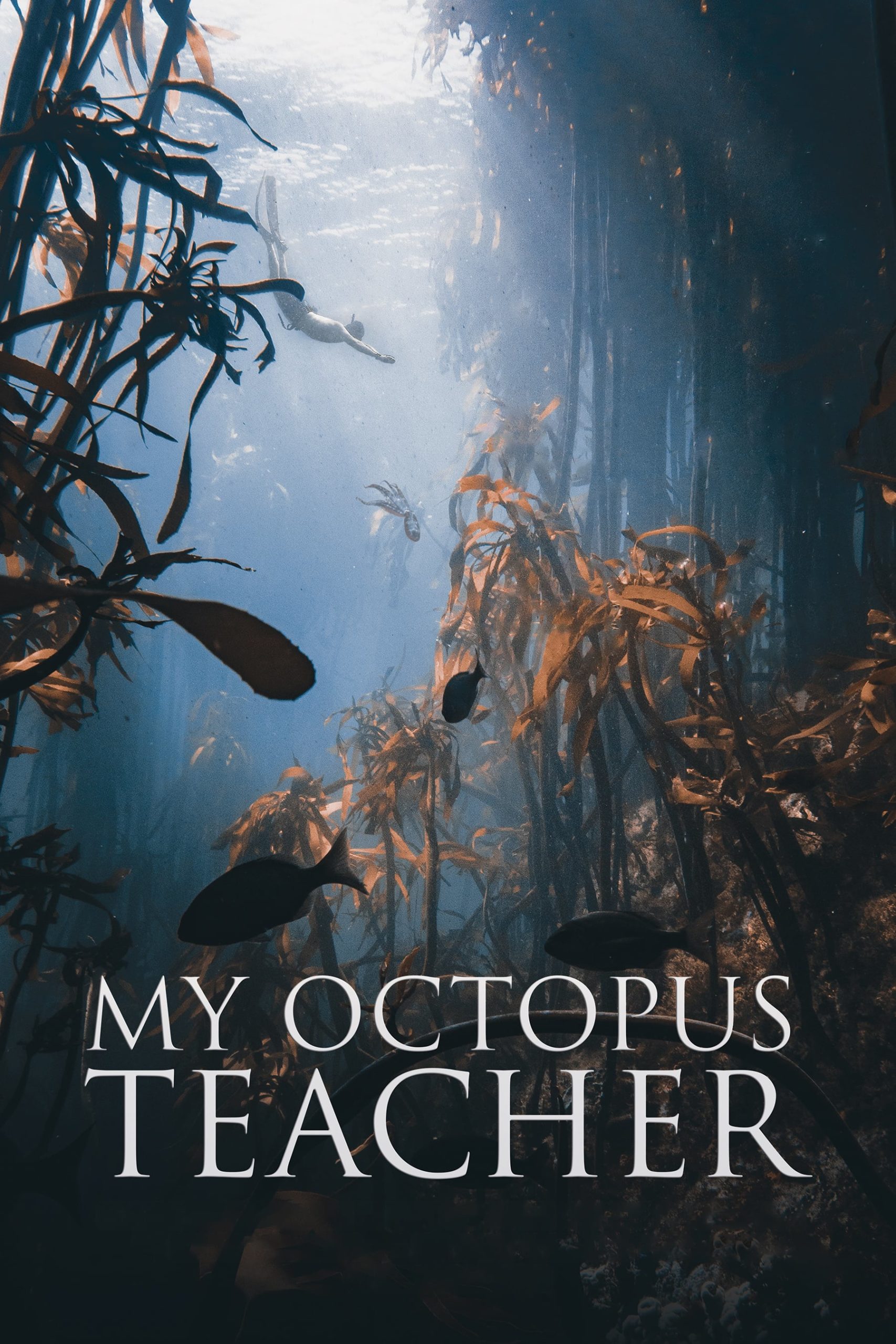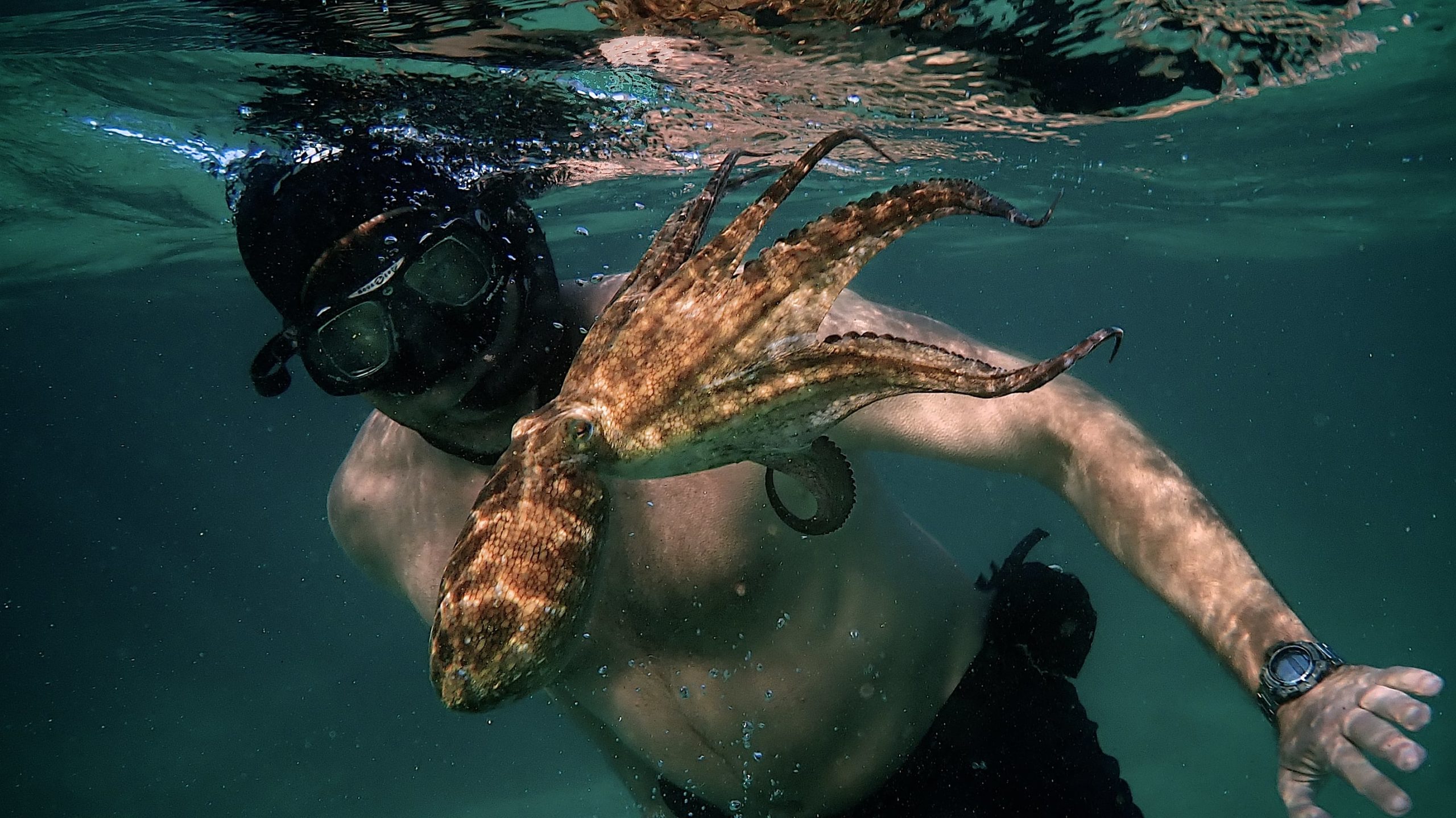
In our little hideaway beneath the waves
My favorite piece of narration in Werner Herzog's tremendous 2005 documentary Grizzly Man goes like this: "[I]n all the faces of all the bears that Treadwell ever filmed, I discover no kinship, no understanding, no mercy. I see only the overwhelming indifference of nature. To me, there is no such thing as a secret world of the bears. And this blank stare speaks only of a half-bored interest in food." That quote was never far from my mind while watching My Octopus Teacher, a cute and almost entirely disposable Netflix original documentary, in that the entire film feels exactly opposed to Herzog's pessimistic dismissal of anthropomorphism. It is the story of a South African man named Craig Foster, who for a period of around a year spent every single day diving in the cold waters off the coast of Cape Town, to observe the life of a common octopus he discovered living below a rock shelf in a kelp forest. As the title suggests, Foster (the only human whose voice we hear, and one of only two we ever see, along with brief footage of his son Tom) took to considering this octopus to be something of a guru in an offbeat way, giving him insights into the world and his place in it - and the octopus's place, for that matter.
To extend the maximum possible credit to Foster, I am almost entirely sure he doesn't mean this literally. As the film progresses towards its conclusion, it becomes more and more clear that he really does understand that the octopus doesn't have anything you might call human emotions, and its experience of its cephalopodal life does not track to how he or you or I might experience those same events, no matter how smart we might suspect octopodes to be (and they may, in fact, be extremely damn smart). Maybe this is a way of steeling himself against the fact that the life of a common octopus is only a couple of years, and even in the very best-cast scenario, his friendship would top out at slightly less than two years before the octopus laid her eggs and died. Maybe his entire experience of that year with the octopus was entirely based in a kind of heightened scientific curiosity that never betrayed a sense that he was actually best friends with the creature.
If that is the case, it is buried beneath a thick layer of mawkish anthropomorphism. Directors Pippa Ehrlich and James Reed (the film is her debut), and composer Kevin Smuts, are not at all afraid to go all-in on treating the octopus as just a weird little eight-legged person, who had just as much fun playing with Foster as he had playing with her. And I'm not above suggesting that the octopus might very well be doing exactly that - play behavior exists in animals, and again, octopodes are probably really smart. But the film certainly leans into that to a degree that goes far beyond "this man was triggered into having a very profound emotional experience from watching an octopus for several months" and into, well, something titled My Octopus Teacher.
I cannot explain why this rankles me; possibly because the film feels like such a sober exercise in exploring marine life if you subtract out the kitschiness of building itself around the very earnest lessons a sad man learned from his wet little buddy. For it is after all not the story of of an octopus's lifespan but of Foster, a man who appeared to be suffering from something awfully like depression, or at least a monumentally intense case of ennui, before his aquatic meditations snapped him back into the world of humans and encouraged him to be a more emotionally present father, and I'm not going to dispute that he had this experience, exactly the way he describes it. That doesn't make it feel less tacky and saccharine as he's moonishly reeling off his quasi-Herzogian prose and the music is swooning around on the strings.
But as I was saying, if you dive even a tiny bit below the kitschy surface, My Octopus Teacher does manage to feel like an excellent attempt to genuinely discover something of the inhuman world of the kelp forest. Foster's weeks of sitting patiently underwater not only served to acclimate the octopus to his presence, but seemingly every other undersea creature as well, and the footage he captured, along with the several other credited camera operators, offers a gorgeous view into the world of the kelp forest. It's the best kind of nature documentary material, gently floating along but otherwise standing still to see the world simply happen in front of it. It has been cut by Ehrlich and co-editor Dan Schwalm with a leisurely pace that lets the slow moments be slow, and doesn't present the most startlingly intimate footage of sea life with any kind of bombastic emphasis, but simply absorbs it into the gentle rhythm of the film, and Foster's steady narration. It's tremendously beautiful, but it also creates a feeling of the undersea world as a profoundly calming environment, weightless and fluid, and it's easy to see how Foster found it a centering experience even without the presence of the octopus.
There's no robbing this footage of its emotionally evocative beauty, nor its value in presenting the behavior of the octopus and other sea life with such unadorned objectivity. And I won't go so far as to say that My Octopus Teacher even does rob it of these things, though it unnecessarily constrains the film to a specific, sentimental interpretation of the footage, trying so hard to make the octopus a human character that it loses some of its power as a wild animal. This is cute and all, but surely I can't be alone in thinking that Craig Foster shaking loose the blues by emotionally over-attaching himself to an octopus simply isn't as compelling as watching that octopus be itself, free from any need to fit into a human story. As it stands, the film is basically a more sedate version of a hokey old nature documentaries, the kind produced by Disney in the '50s, where a painfully jolly narrator enforces personalities on animals who deserve more dignity than that. It's harmless enough, as far as that goes, but the tone is at war with the footage itself, and it tends to needlessly domesticate images that, at their best, get to something genuinely profound about the way nature exists in despite of humans, not to facilitate our personal growth.
To extend the maximum possible credit to Foster, I am almost entirely sure he doesn't mean this literally. As the film progresses towards its conclusion, it becomes more and more clear that he really does understand that the octopus doesn't have anything you might call human emotions, and its experience of its cephalopodal life does not track to how he or you or I might experience those same events, no matter how smart we might suspect octopodes to be (and they may, in fact, be extremely damn smart). Maybe this is a way of steeling himself against the fact that the life of a common octopus is only a couple of years, and even in the very best-cast scenario, his friendship would top out at slightly less than two years before the octopus laid her eggs and died. Maybe his entire experience of that year with the octopus was entirely based in a kind of heightened scientific curiosity that never betrayed a sense that he was actually best friends with the creature.
If that is the case, it is buried beneath a thick layer of mawkish anthropomorphism. Directors Pippa Ehrlich and James Reed (the film is her debut), and composer Kevin Smuts, are not at all afraid to go all-in on treating the octopus as just a weird little eight-legged person, who had just as much fun playing with Foster as he had playing with her. And I'm not above suggesting that the octopus might very well be doing exactly that - play behavior exists in animals, and again, octopodes are probably really smart. But the film certainly leans into that to a degree that goes far beyond "this man was triggered into having a very profound emotional experience from watching an octopus for several months" and into, well, something titled My Octopus Teacher.
I cannot explain why this rankles me; possibly because the film feels like such a sober exercise in exploring marine life if you subtract out the kitschiness of building itself around the very earnest lessons a sad man learned from his wet little buddy. For it is after all not the story of of an octopus's lifespan but of Foster, a man who appeared to be suffering from something awfully like depression, or at least a monumentally intense case of ennui, before his aquatic meditations snapped him back into the world of humans and encouraged him to be a more emotionally present father, and I'm not going to dispute that he had this experience, exactly the way he describes it. That doesn't make it feel less tacky and saccharine as he's moonishly reeling off his quasi-Herzogian prose and the music is swooning around on the strings.
But as I was saying, if you dive even a tiny bit below the kitschy surface, My Octopus Teacher does manage to feel like an excellent attempt to genuinely discover something of the inhuman world of the kelp forest. Foster's weeks of sitting patiently underwater not only served to acclimate the octopus to his presence, but seemingly every other undersea creature as well, and the footage he captured, along with the several other credited camera operators, offers a gorgeous view into the world of the kelp forest. It's the best kind of nature documentary material, gently floating along but otherwise standing still to see the world simply happen in front of it. It has been cut by Ehrlich and co-editor Dan Schwalm with a leisurely pace that lets the slow moments be slow, and doesn't present the most startlingly intimate footage of sea life with any kind of bombastic emphasis, but simply absorbs it into the gentle rhythm of the film, and Foster's steady narration. It's tremendously beautiful, but it also creates a feeling of the undersea world as a profoundly calming environment, weightless and fluid, and it's easy to see how Foster found it a centering experience even without the presence of the octopus.
There's no robbing this footage of its emotionally evocative beauty, nor its value in presenting the behavior of the octopus and other sea life with such unadorned objectivity. And I won't go so far as to say that My Octopus Teacher even does rob it of these things, though it unnecessarily constrains the film to a specific, sentimental interpretation of the footage, trying so hard to make the octopus a human character that it loses some of its power as a wild animal. This is cute and all, but surely I can't be alone in thinking that Craig Foster shaking loose the blues by emotionally over-attaching himself to an octopus simply isn't as compelling as watching that octopus be itself, free from any need to fit into a human story. As it stands, the film is basically a more sedate version of a hokey old nature documentaries, the kind produced by Disney in the '50s, where a painfully jolly narrator enforces personalities on animals who deserve more dignity than that. It's harmless enough, as far as that goes, but the tone is at war with the footage itself, and it tends to needlessly domesticate images that, at their best, get to something genuinely profound about the way nature exists in despite of humans, not to facilitate our personal growth.
Categories: documentaries, netflix originals, Uncategorized






